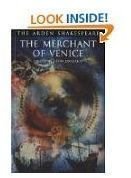Shakespeare's The Merchant of Venice Debate For High School Classroom
Tale of the Bond for Flesh
What is a bond for flesh? An bond is an agreement, or contract. When a contract is signed between a lender and a borrower, then a
bond for flesh states that if the borrower does not repay his debt on time, the creditor is entitled to take his payment in an amount of flesh from the debtor’s body.
John Russell Brown, editor of the Arden Shakespeare’s 1988 edition of <em>The Merchant of Venice</em>, traces the tale of a bond for human flesh to ancient times in Persia and India. By the end of the thirteenth century, there is an English translation of the tale in which the creditor is a Jew. In the fifteenth century, we have an English translation in which the wooing has been added to the flesh bond storyline.
There is no doubt that there are versions of this tale told through the ages that are virulently anti-Semitic. Take, for example, the “wicked Jew” of the fourteenth century Italian collection, Il Pecorone. The character is not even given the dignity of a name.
Shakespeare’s Version
In Shakespeare’s age-old tale, Shylock loans money to Antonio, a merchant in Venice, Italy, where the play is set. Later in the play, Antonio is unable to pay Shylock back, and Shylock demands his right to repayment via a pound of Antonio’s flesh.
Shylock has a daughter, Jessica. Lorenzo, a Christian, is a friend to Antonio. He is in love with and wooing Jessica. Much to her father’s dismay, Jessica steals her father’s money, runs off with Lorenzo, and converts to Christianity.
Another plot in this play involves Portia, a noblewoman, and Bassanio, who is a friend of Antonio’s and Lorenzo’s. Bassanio successfully woos the lady Portia. Portia, probably out of love for Bassanio, masquerades as a man in court and saves Antonio’s life by arguing against the flesh bond.
Shylock
Shakespeare is known for writing his universal characters with an objective eye. The Merchant of Venice is no exception. The inclusion of Jessica gives Shylock plenty of incentive for anger and desire for revenge.
But there is more. Remember the status of the Jew in so many societies over the past thousand years. Jews have been barred from many forms of employment, which is one reason they became money-lenders. The interest charged on loans gave Jews an opportunity to make a living.
Jews have lived in societies that outlawed Judaism itself. The answers were to flee, to convert, to hide, or to die. Jews have lived with forced curfews and inside the walls of ghettos. While Jews have enjoyed success in some societies, they have been singled out to be the victims of prejudice and hatred in others.
There is debate about whether or not there were Jews living in London in Shakespeare’s day. The theory is that they were present but not openly Jewish. However, Shakespeare set his play in at time in Italy in which Jews were forced to live inside the ghetto gates and treated with disdain by the larger society. They were reviled, openly spat on in public. This is how Shylock lived.
Character Speech
Portia’s “The Quality of Mercy” is a famous speech. Its pretty words do not, however, begin to touch the human outcry of suffering and pleas we hear from Shylock. As he points out in court, all his money was taken by Jessica; he has no way to live. Shakespeare gives Shylock the opportunity in court to point out the hypocrisy of his Christian neighbors, for they revile him for wanting a pound of flesh, but they do take slaves and treat them as asses. Shylock cleverly suggests that they free their slaves and marry them to their daughters (remember that Lorenzo has his Jessica.)
When Shylock confronts Antonio sitting in debtor’s prison, he seems to make Antonio pay for his prejudice by saying, “Thou call’dst me a dog before thou hadst a cause, But since I am a dog, beware my fangs,—” He continues to make clear to Antonio that he will have his pound of flesh.
Before the court scene, Shylock pours out his hear to his friend, Tubal, with his most famous “Hath not a Jew eyes? Hath not a Jew hands?” speech. Some may not agree with Shylock’s choice to say in court that if he were repaid thousands of times over in ducats, “I would not draw them! I would have my bond!” But it is arguable that Shakespeare, in Shylock, has drawn a sympathetic character.
Classroom
When studying Shakespeare’s The Merchant of Venice, guide your students to write a persuasive essay arguing for or against an anti-Semitic slant in The Merchant of Venice. Instruct them to use instances in the play to back up their arguments.
This post is part of the series: Teaching Shakespeare’s Plays
Lesson plans for high school English teachers to help their students tackle the Bard’s work, one play at a time.
